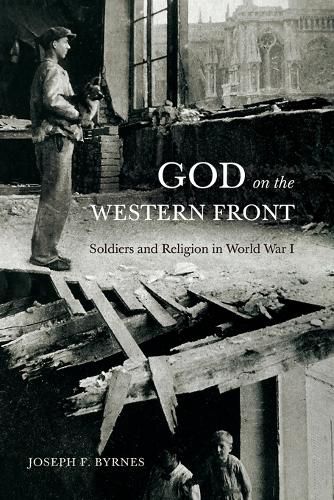Readings Newsletter
Become a Readings Member to make your shopping experience even easier.
Sign in or sign up for free!
You’re not far away from qualifying for FREE standard shipping within Australia
You’ve qualified for FREE standard shipping within Australia
The cart is loading…






This title is printed to order. This book may have been self-published. If so, we cannot guarantee the quality of the content. In the main most books will have gone through the editing process however some may not. We therefore suggest that you be aware of this before ordering this book. If in doubt check either the author or publisher’s details as we are unable to accept any returns unless they are faulty. Please contact us if you have any questions.
From 1914 to 1918, religious believers and hopeful skeptics tried to find meaning and purpose behind divinely willed destruction. God on the Western Front is a history of lived religion across national boundaries, religious affiliations, and class during World War I, utilizing an expansive record of primary sources.
Joseph F. Byrnes takes readers on a tour of the battlefields of France, listening to the words of German, French, and English soldiers; going behind the lines to hear from the men and women who provided pastoral and medical care; and reviewing the religious writings of priests, bishops, ministers, and rabbis as they tried to make sense of it all. The story begins with citizens at home as they responded to the obligation to make war and then focuses on the "God-talk" and "nation-talk" that soldiers used to express their foundational religious experiences. Byrnes's study attends to the words of average men who struggled to articulate their religious sentiments, alongside the generals Helmuth von Moltke, Ferdinand Foch, and Douglas Haig and the soldier theologians Franz Rosenzweig, Paul Tillich, Pierre Teilhard de Chardin, and Geoffrey Studdert Kennedy. In doing so, he shows how religious and battle experience are intertwined and showcases the wide range of spiritual responses that emerged across boundaries.
Going beyond the typical constraints of studies focused either on one nation or one confessional affiliation, Byrnes's international and interfaith approach breaks new ground. It will appeal to scholars and students of modern European history, religious history, and the history of war.
$9.00 standard shipping within Australia
FREE standard shipping within Australia for orders over $100.00
Express & International shipping calculated at checkout
This title is printed to order. This book may have been self-published. If so, we cannot guarantee the quality of the content. In the main most books will have gone through the editing process however some may not. We therefore suggest that you be aware of this before ordering this book. If in doubt check either the author or publisher’s details as we are unable to accept any returns unless they are faulty. Please contact us if you have any questions.
From 1914 to 1918, religious believers and hopeful skeptics tried to find meaning and purpose behind divinely willed destruction. God on the Western Front is a history of lived religion across national boundaries, religious affiliations, and class during World War I, utilizing an expansive record of primary sources.
Joseph F. Byrnes takes readers on a tour of the battlefields of France, listening to the words of German, French, and English soldiers; going behind the lines to hear from the men and women who provided pastoral and medical care; and reviewing the religious writings of priests, bishops, ministers, and rabbis as they tried to make sense of it all. The story begins with citizens at home as they responded to the obligation to make war and then focuses on the "God-talk" and "nation-talk" that soldiers used to express their foundational religious experiences. Byrnes's study attends to the words of average men who struggled to articulate their religious sentiments, alongside the generals Helmuth von Moltke, Ferdinand Foch, and Douglas Haig and the soldier theologians Franz Rosenzweig, Paul Tillich, Pierre Teilhard de Chardin, and Geoffrey Studdert Kennedy. In doing so, he shows how religious and battle experience are intertwined and showcases the wide range of spiritual responses that emerged across boundaries.
Going beyond the typical constraints of studies focused either on one nation or one confessional affiliation, Byrnes's international and interfaith approach breaks new ground. It will appeal to scholars and students of modern European history, religious history, and the history of war.